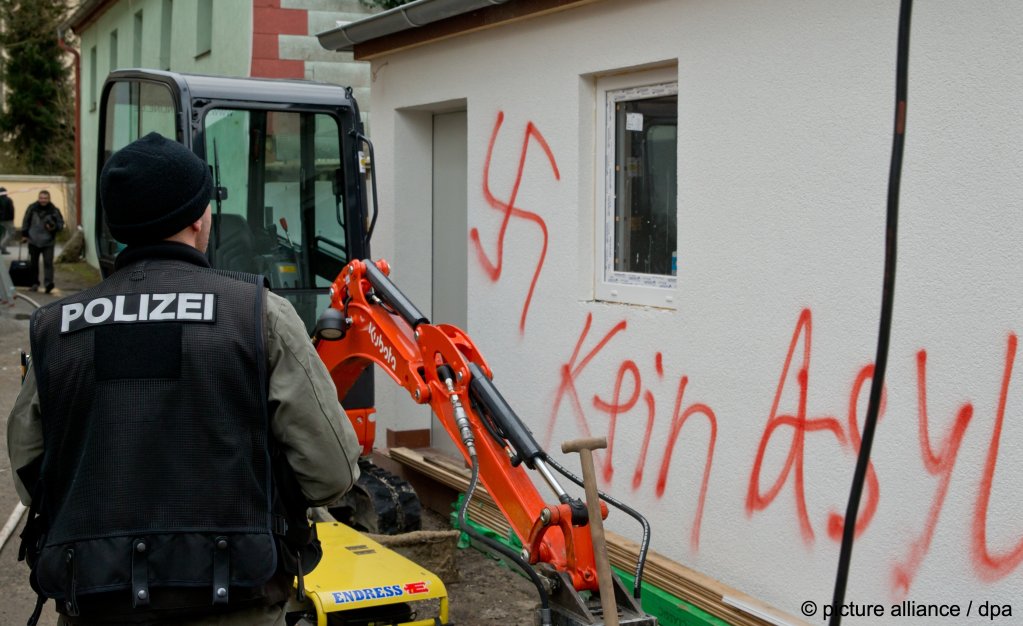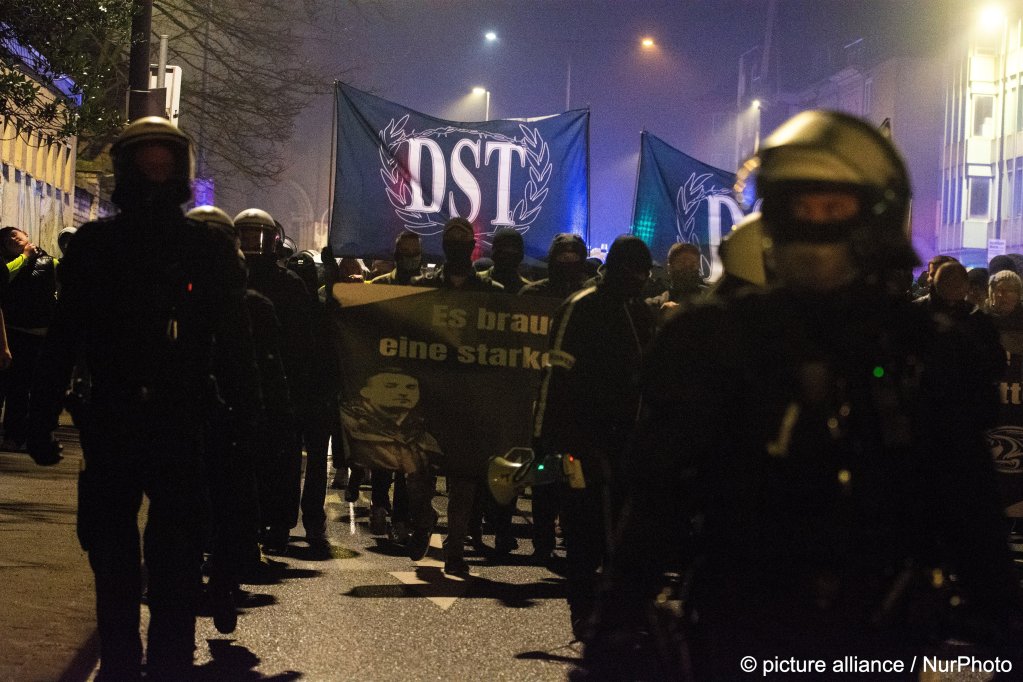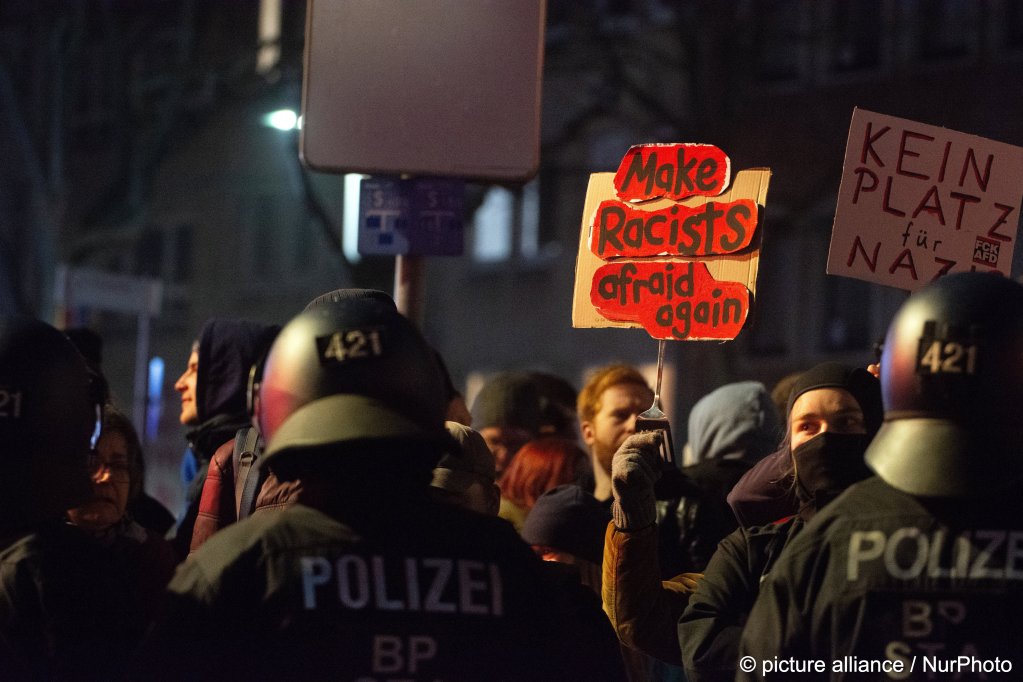According to information released by the German government, the number of attacks on asylum-seeker accommodation increased during 2024. Overall, attacks with an extreme far-right element have also risen.
The information was released by the German Interior Ministry following an information request "Kleine Anfrage" from the Left Party (Die Linke) group in the German parliament, reported the RedaktionsNetzwerk Deutschland (RND).
The German police said they registered 218 "politically motivated attacks against refugee and asylum seeker accommodation" in 2024. This is where the accommodation was either the target of the attack or the place where an attack or crime against a refugee or asylum seeker took place.
Twenty-eight of these attacks were classed as "violent crimes" and 14 people were injured during these attacks, including one child, stated information released by the Ministry of the Interior, reported the German Protestant press service EPD.
Read AlsoSuspected arson at refugee facility in Germany
'Politically motivated' attacks
Based on current information, the number of "politically motivated" attacks against migrants, refugees and asylum seekers away from official accommodation centers actually reduced, reported EPD. German authorities recorded 1,905 such attacks in 2024, including 237 that were classified as "violent." In 2023, that number stood at 2,405.

However, EPD underlined that the 2024 figures might yet increase, as many police forces haven’t returned their data for the final quarter of 2024.
Hate crimes against mosques also increased in 2024, reported the Catholic news agency KNA. In the last few weeks, added KNA, "numerous" bomb threats and damage to property had been recorded at mosques around Germany, according to the Muslim Coordination Council (Koordinationsrat der Muslime -- KRM). They said they took this as a message of hate towards their community.
A spokesperson for KRM said they found recent developments "alarming" and underlined that they believed mosques should be "places of prayer, education and for community engagement." He said attacks from "radical forces" needed to stop. El Kaada, the spokesperson said that he believed part of the blame for these attacks should lie at the feet of an "increasingly populist debate regarding migration."
Left party: Numbers of attacks 'worryingly high'
Clara Bünger, the Left party MP and migration spokesperson for her group said she felt that the number of attacks, slights and threats towards refugees, asylum seekers and migrants was "worryingly high."
Bünger added that she was concerned that it seemed to her that some politicians and members of society's attitude was to shrug their shoulders when faced with news of this kind of attack. Bünger said that many of these people were looking for protection in Germany, but instead what they received was "racist attacks and violence." Bünger said she hoped people would never allow themselves to get used to this kind of behavior.
Overall, the number of crimes committed by, or in the name of right-wing extremists increased in 2024, reported the French news agency Agence France Presse (AFP). In figures provided by the German police, up to November 30, 2024, 33, 963 crimes were classified as being of an "extreme right-wing nature," or carried out by right-wing gangs or criminals.

The full number of crimes for the year will be presented in May this year by the German Federal Criminal Agency (Bundeskriminalamt – BKA). The provisional figures for 2024 are higher than the 28,945 crimes of this nature registered in 2023 by the BKA. That, reported AFP, means that the increase is at least 17 percent.
Read AlsoGermany: Significant changes for refugees and asylum seekers in 2024
Link between elections and increase in crimes?
The Interior Ministry explained that the increase in the number of crimes in 2024 may have been linked to the numerous regional elections that took place across Germany in 2024, elections where the right-wing and anti-migration AfD won significant vote shares in three of the main eastern German states, Thuringia, Saxony and Brandenburg.
Of these right-wing crimes, reported AFP, 1,136 were registered as "violent crimes," of which 988 involved bodily harm and five murders and five attempted murders. There were also 17 arson attacks.
The majority of these right-wing attacks were classed as "propaganda crimes" or "hate speech." 1,942 involved damage to property, 608 were classed as threats or coercions, reported AFP.

Another member of the Left party, Martina Renner, who is also an expert on right-wing extremism, said that she believed there should be harsher penalties for those committing this type of crime. She told AFP, "if we don’t want to see 3,000 of these Neo-Nazi crimes committed each month, then we need to make sure that there are consequences to carrying out this type of crime. We do not want to return to those years [following the fall of the wall when for a time attacks on migrants and a certain amount of anarchy reigned before Germany was properly united] where people went around with baseball bats and attacks on democrats and the burning of refugee homes was the norm."
According to Brenner, there is a link between the increase in these types of right-wing-motivated crimes and the growing strength of the more far-right elements of the AfD party. In Brenner’s view, banning the AfD would help remove some of the power of the biggest far-right scenes in Germany.
With EPD, AFP and KNA
